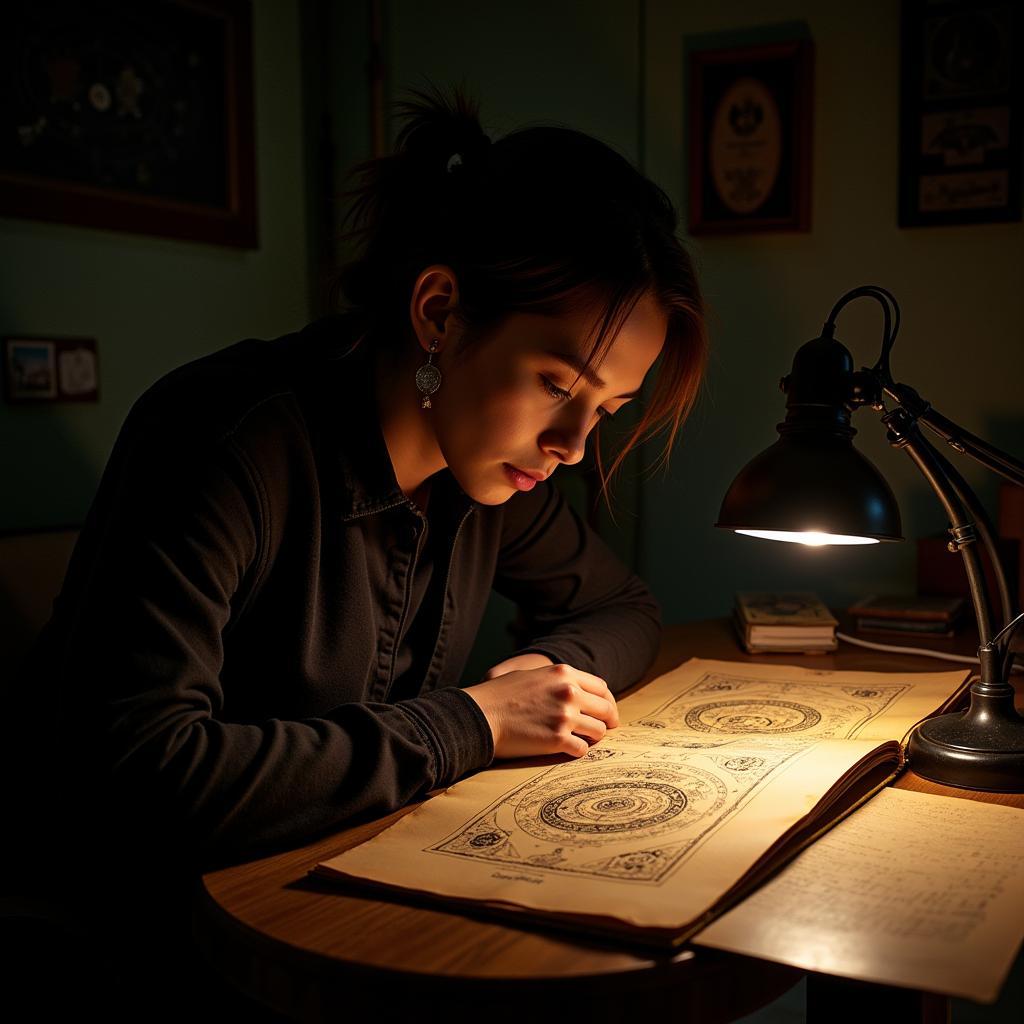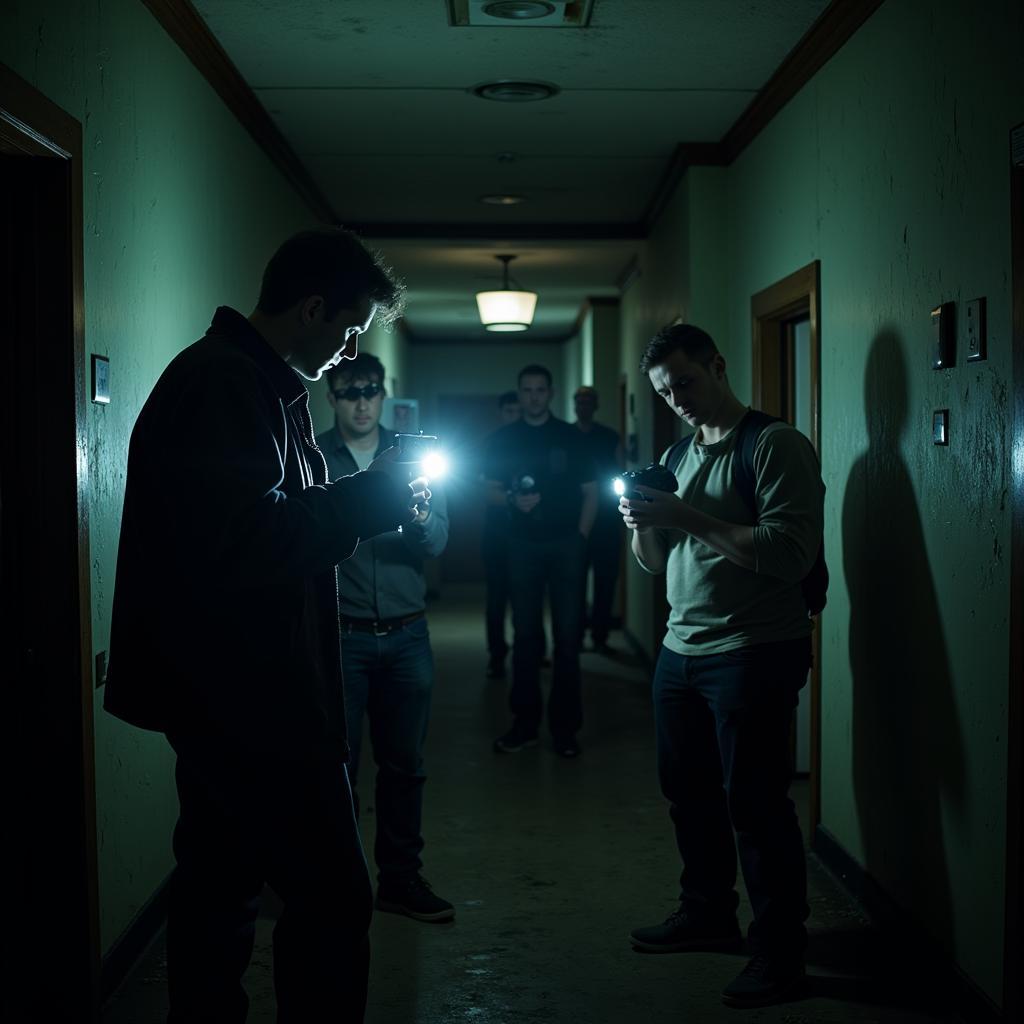The world of paranormal research is shrouded in mystery and intrigue. For a Student Researcher, this unexplored territory offers a unique and fascinating field of study. However, navigating the vast and often contradictory information available can be daunting. This guide aims to equip aspiring paranormal investigators with the tools and knowledge necessary to approach this challenging field.
 Student researcher examining ancient texts
Student researcher examining ancient texts
Embracing the Scientific Method in Paranormal Investigation
One might assume that science and the paranormal are incompatible. However, the key to successful paranormal research lies in applying the same rigorous methodologies used in traditional scientific disciplines. This means approaching claims with a healthy dose of skepticism, formulating testable hypotheses, and designing experiments to gather empirical evidence.
Essential Skills for the Aspiring Paranormal Researcher
- Critical Thinking: The ability to analyze information objectively, identify biases, and differentiate between fact and speculation is crucial.
- Research Proficiency: A strong foundation in research methods, including data collection, analysis, and interpretation, is essential.
- Open-Mindedness: While skepticism is important, maintaining an open mind and considering alternative explanations is equally vital.
- Ethical Conduct: Respect for the unknown and for the individuals involved in investigations is paramount. This includes obtaining informed consent, protecting privacy, and avoiding sensationalism.
Delving into the Paranormal: Areas of Study
The field of paranormal research encompasses a wide range of phenomena, each with its own set of challenges and methodologies. Some popular areas of study include:
- Cryptology: The study of cryptids, creatures whose existence is yet to be officially recognized by science, such as Bigfoot or the Loch Ness Monster.
- Ufology: This branch focuses on unidentified flying objects (UFOs), examining potential extraterrestrial activity and its impact on humanity.
- Ghost Hunting: Perhaps the most popular area, ghost hunting involves investigating claims of hauntings, using tools like EMF readers and EVP recorders to detect paranormal activity.
 Paranormal research team conducting investigation
Paranormal research team conducting investigation
Navigating the Labyrinth: Resources for Student Researchers
- Online Databases and Journals: Numerous online resources offer access to historical accounts, research papers, and case studies. The Parapsychological Association and the Society for Psychical Research are excellent starting points.
- Paranormal Societies and Groups: Joining a local paranormal society provides opportunities for hands-on experience, mentorship, and networking.
- University Research Programs: Some universities offer courses or research programs in parapsychology or related fields.
A Word of Caution
While the paranormal can be alluring, it is essential to remember that safety should always be the top priority. Avoid investigating alone, be aware of your surroundings, and always have a plan in case of emergencies.
Conclusion: Embracing the Journey of Discovery
Paranormal research, at its core, is a quest for knowledge and understanding. For the student researcher, it offers a unique opportunity to challenge conventional thinking, explore the boundaries of human perception, and contribute to unraveling the mysteries that lie beyond our current understanding.
FAQs about Student Researchers in Paranormal Investigation
1. What academic background is helpful for paranormal research?
While a specific degree isn’t mandatory, a background in science, psychology, history, or journalism can provide valuable skills for conducting thorough and objective investigations.
2. Are there ethical considerations specific to paranormal research?
Absolutely! Respect for the privacy and beliefs of individuals involved in investigations is paramount. Obtaining informed consent before conducting any research is crucial.
3. How can I differentiate between credible evidence and hoaxes?
Developing critical thinking skills and learning to identify potential biases in evidence is essential. Cross-referencing information, consulting with experienced researchers, and remaining skeptical can help discern genuine findings from fabrications.
4. What are some common misconceptions about paranormal research?
Many people believe that paranormal research is solely about proving the existence of ghosts or aliens. However, the field encompasses a much broader range of phenomena and often focuses on understanding unexplained experiences and their impact on individuals and society.
5. What if I experience something unexplainable during an investigation?
It’s important to document any unusual experiences thoroughly and objectively. Avoid jumping to conclusions and seek input from other researchers to gain different perspectives on the event.
Still have questions? Need assistance with your research?
Contact us! Our team of experienced paranormal researchers is here to help guide your journey.
Phone: 0904826292
Email: research@gmail.com
Address: No. 31, Alley 142/7, P. Phú Viên, Bồ Đề, Long Biên, Hà Nội, Việt Nam
We offer 24/7 support to assist you with all your Paranormal Research needs.
research programs for high school students
interesting research topics for students
 Paranormal research library
Paranormal research library
Explore further:
- Learn more about how to structure your research with our “research paper outline apa format template.”
- Discover the fascinating work of a “google deepmind student researcher” pushing the boundaries of artificial intelligence.
- Consider the various “research programs for medical students” that intersect with the study of consciousness and unexplained phenomena.